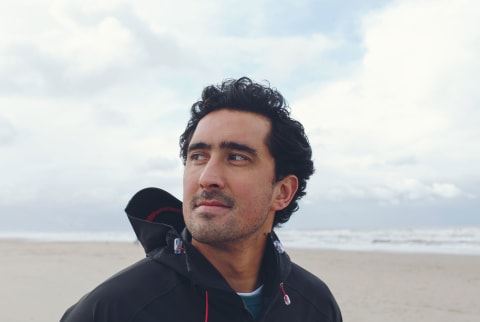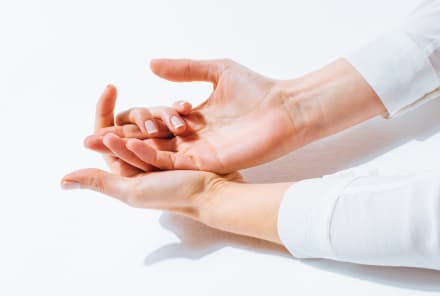Advertisement
How Stress Can Make You Stronger: A Biohacker's Top Tip For Mental Resilience


"OK, I officially don't feel my toes anymore," said the high school version of me, from the back of the open cargo truck transporting my squad of eight military sharpshooters. It was -30°C (-22°F) outside, we'd already been traveling for two hours, and there was about as much time left to go. Even worse, the wind was howling from all angles, and we could all feel the chill penetrating our bones.
It was one of the coldest feelings I've had to endure in my life—several hours of being completely jackhammered (a condition in which you can't stop shaking) and thinking I was going to lose my toes.
In the military, I saw firsthand how humans can endure extreme conditions.
By the time we arrived at our home for the week, none of us felt any better. We were staying in the pit of an abandoned strip mine with a stone floor and a wind tunnel. The temperatures were as unforgiving as -30°C and it even got down to -35°C at midnight. To make matters worse, we all had to do night patrol for at least an hour.
Sleeping in a tent with a small stove was the only time we could stop shivering and enjoy a brief moment of warmth.
During the day, we practiced sharpshooting by camouflaging (aka lying motionless in the snow and trying to crawl toward a target), measuring distances with binoculars, making landscape maps by drawing on a piece of paper, firing long distances, and so much more.
My squad and I were constantly drenched in the rain, sleeping underneath trees, crawling through the snow, making our way through swamps, crossing waist-deep rivers, or just walking for hours through the forest in the middle of a cold winter night.
The experience sparked my interest in how we adapt to stressors.
Through my time in the military, I discovered that life will throw countless challenges and obstacles at you. That's just how the world works, and there's nothing you can do about it. Eventually, something negative or difficult is going to happen.
While that information might seem daunting, I actually see it as empowering—because it means we can all proactively prepare and cultivate personal resilience.
How? By exposing ourselves to somewhat stressful and challenging situations on a regular basis. For example, I'm a major advocate of voluntarily training our nervous system and psychology with positive stressors, including exercise, sauna, intermittent fasting, meditation, breathwork, and cold exposure.
Every time we do so, we tap into the human body's innate ability to adapt and get stronger. This biological phenomenon is called "hormesis"—in other words, "What doesn't kill me makes me stronger." Inspired by all of this, I have written a book called Stronger by Stress that breaks down the science and practical application of this process.
The takeaway.
As individuals, we often default to our comfort zone, which keeps us vulnerable to the unexpected difficulties that are bound to happen. Instead, I highly recommend incorporating small, healthy stressors into your days as a strategy to help promote better resilience for anything life throws your way.
Watch Next
Enjoy some of our favorite clips from classes
Enjoy some of our favorite clips from classes
What Is Meditation?
Mindfulness/Spirituality | Light Watkins
Box Breathing
Mindfulness/Spirituality | Gwen Dittmar
What Breathwork Can Address
Mindfulness/Spirituality | Gwen Dittmar
The 8 Limbs of Yoga - What is Asana?
Yoga | Caley Alyssa
Two Standing Postures to Open Up Tight Hips
Yoga | Caley Alyssa
How Plants Can Optimize Athletic Performance
Nutrition | Rich Roll
What to Eat Before a Workout
Nutrition | Rich Roll
How Ayurveda Helps Us Navigate Modern Life
Nutrition | Sahara Rose
Messages About Love & Relationships
Love & Relationships | Esther Perel
Love Languages
Love & Relationships | Esther Perel
What Is Meditation?
Box Breathing
What Breathwork Can Address
The 8 Limbs of Yoga - What is Asana?
Two Standing Postures to Open Up Tight Hips
How Plants Can Optimize Athletic Performance
What to Eat Before a Workout
How Ayurveda Helps Us Navigate Modern Life
Messages About Love & Relationships
Love Languages
Advertisement

Study Shows Doing This Gives Your Brain A 24-Hour Boost (No Caffeine Involved)
Molly Knudsen, M.S., RDN

Study Shows Doing This Gives Your Brain A 24-Hour Boost (No Caffeine Involved)
Molly Knudsen, M.S., RDN

Study Shows Doing This Gives Your Brain A 24-Hour Boost (No Caffeine Involved)
Molly Knudsen, M.S., RDN

Study Shows This Vitamin May Lower Your Risk Of Alzheimer’s By 17%
Molly Knudsen, M.S., RDN

Study Shows Doing This Gives Your Brain A 24-Hour Boost (No Caffeine Involved)
Molly Knudsen, M.S., RDN

Study Shows This Vitamin May Lower Your Risk Of Alzheimer’s By 17%
Molly Knudsen, M.S., RDN















